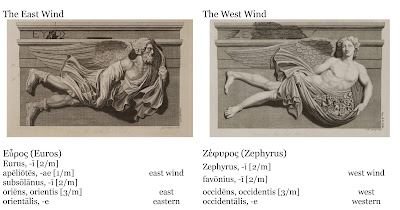Sphera terrestris …dīvīsa est in trēs continentēs; nostram, quæ subdīviditur in Eurōpam, Asiam, & Āfricam, in Americam (cuius incolæ sunt antipodēs nōbīs) & in Terram Austrālem, adhūc incognitam. (Comenius CVII: 1658)
The terrestrial sphere … is divided into three continents,
ours, which is subdivided into Europe, Asia, Africa, America, (whose inhabitants
are antipodes to us;) and the South Land, yet unknown.
antipodēs from Greek: ἀντίποδες
(antípodes), referring, in the world of Comenius, to the place on the opposite
side of the Earth from a given point, the English derivative antipodean
being an informal reference to the inhabitants of Australia and New Zealand,
but Comenius uses it to describe America.
Images #1 and #2
[i] terra austrālis nōndum cognita (1570 (the southern land not
yet known)
[ii] terra austrālis incognita (1618) (the unknown
southern land)
However, the maps do not refer to Australia but to an as yet undiscovered (or partially discovered), unknown (or not yet known), disputed and, at times, dismissed notion of a landmass in the southern hemisphere, which was first suggested by Aristotle in the 4th century BC. And it did take a little time to prove that he was right!
What
we call the continent of Australia was originally named New Holland, the term Terra
Austrālis reserved for the southern landmass referred to above.
The English explorer Matthew Flinders was the first to
circumnavigate New Holland in 1803, and used the name ‘Australia’ to describe it
on a map in 1804. It was Flinders who suggested the name now used, the New
South Wales Governor Lachlan Macquarie endorsing the name to replace New
Holland in communication with London in 1817, and the name came into common
local usage.
Image #3: Map of Australia by Flinders (1814) ascribing the
name Terra Austrālis or Australia
On the “reassignment” of the name Terra Austrālis Flinders
wrote:
“There is no probability, that any other detached body of
land, of nearly equal extent, will ever be found in a more southern latitude;
the name Terra Australis will, therefore, remain descriptive of the
geographical importance of this country, and of its situation on the globe: it
has antiquity to recommend it; and, having no reference to either of the two
claiming nations, appears to be less objectionable than any other which could
have been selected.”
Flinders was, of course, wrong in making that bold assertion
because the “unknown southern land” did become known, by which point, however, the
name now belonged to Australia.
Maybe from the 4th century BC we hear Aristotle’s
voice telling Flinders: “I told you so!” Moreover, Aristotle had already given
it a name since, at the time, the north lay under the constellation Ἄρκτος [Árktos] i.e.
“Ursa Major” (the Great Bear). Therefore, he called the other end of the world ἀνταρκτικός [antarktikós]
i.e. opposite to the north > Latin: antarcticus, -a, -um (south) > New
Latin …
“The five largest islands or peninsulas … are termed continents, and designated by the names Eurasia, Africa, North America, South America, and Australia. …. The elevated region round the South Pole is crowned by the unexplored and scarcely discovered continent of Antarctica.” [Hugh Robert Mill, “The Continental Area” (1891)]























